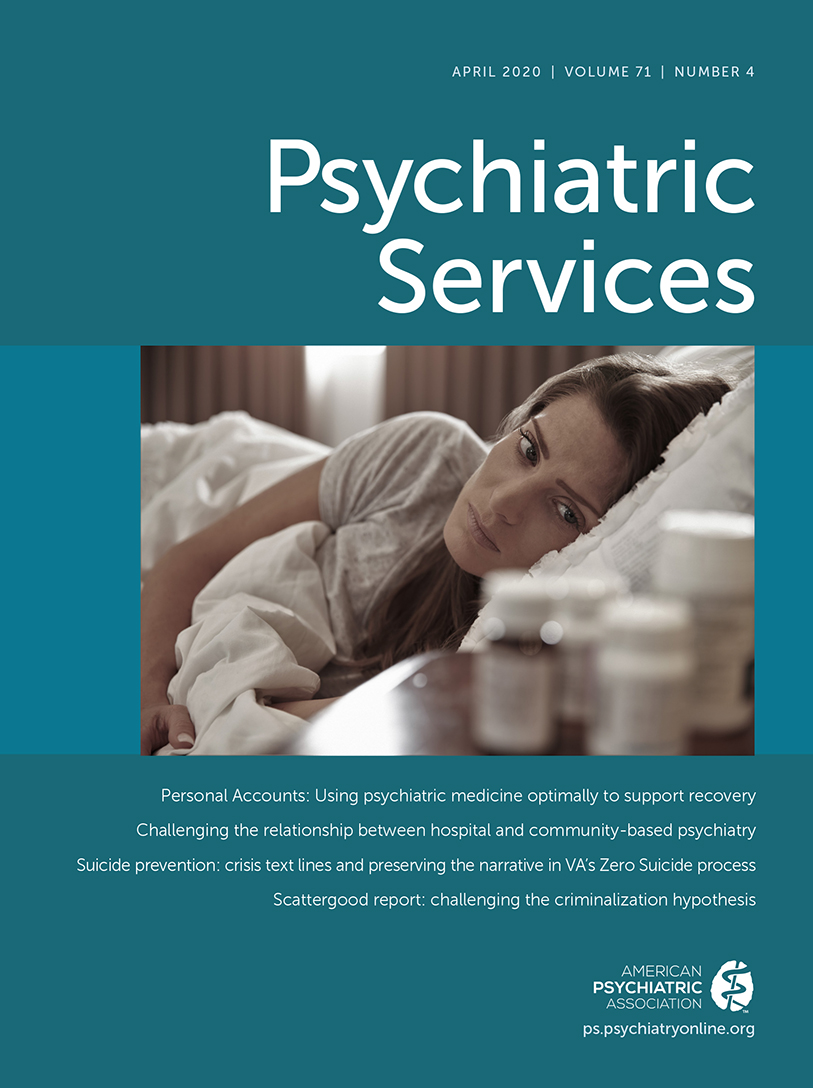Health Disparities Among People With Serious Mental Illness
This is the February 2020 Editor’s Choice collection. To review all collections, visit the Editor’s Choice section of ps.psychiatryonline.org.
People with serious mental illness face glaring health disparities, with mortality rates two to three times higher than those of the general population. This disparity translates to life expectancies shortened by 10–28.5 years. Cardiometabolic factors, including diabetes, hypertension, hyperlipidemia, and cardiovascular disease, are major drivers of this early mortality. These illnesses are both caused and compounded by smoking, lack of physical activity, poor nutrition, and social determinants that negatively affect the health of people with serious mental illness.
This collection begins with articles describing factors that affect the health and well-being of people with serious mental illness, including the prevalence of diabetes and obesity, high rates of smoking, and delays in seeking medical care. Subsequent articles highlight low rates of screening for cardiometabolic factors, communicable disease, and cancer among people with serious mental illness. Interventions to address these issues are highlighted, including smoking cessation efforts, involving peers to support patients with self-management in the Health and Recovery Peer Program, and group-based medical illness self-management with the Living Well initiative. The collection concludes with policy considerations to improve outcomes for people with serious mental illness, including a compelling argument for recognition of serious mental illness as a disparities category.
Key Contributors
Correlates of Co-Occurring Diabetes and Obesity Among Community Mental Health Program Members With Serious Mental Illnesses
Cook JA, Razzano L, Jonikas JA, et al.
Psychiatr Serv 2016; 67:1269–1271
Cigarette Smoking by Patients With Serious Mental Illness, 1999–2016: An Increasing Disparity
Dickerson F, Schroeder J, Katsafanas E, et al.
Psychiatr Serv 2018; 69:147–153
Delays in Seeking General Medical Services and Measurable Abnormalities Among Individuals With Serious Mental Illness
Spivak S, Cullen BA, Eaton W, et al.
Psychiatr Serv 2018; 69:479–482
Screening
Rates of Cervical Cancer Screening Among Women With Severe Mental Illness in the Public Health System
James M, Thomas M, Frolov L, et al.
Psychiatr Serv 2017; 68:839–842
Low Rates of HIV Testing Among Adults With Severe Mental Illness Receiving Care in Community Mental Health Settings
Mangurian C, Cournos F, Schillinger D, et al.
Psychiatr Serv 2017; 68:443–448
Interventions to Improve Metabolic Risk Screening Among Adult Patients Taking Antipsychotic Medication: A Systematic Review
Melamed OC, Wong EN, LaChance LR, et al.
Psychiatr Serv 2019; 70:1138–1156
Interventions
“Why Me?” Understanding the HCV Care Continuum Among People With Serious Mental Illness
Arnold RM, Machover H, Wall ME, et al.
Psychiatr Serv 2018: 69:1188–1190
Implementation of a Lifestyle Intervention for People With Serious Mental Illness in State-Funded Mental Health Centers
Bartels SJ, Aschbrenner KA, Pratt SI, et al.
Psychiatr Serv 2018; 69:664–670
Implementing a Whole Health Model in a Community Mental Health Center: Impact on Service Utilization and Expenditures
Bouchery EE, Wishon Siegwarth A, Natzke B, et al.
Psychiatr Serv 2018; 69:1075–1080
Low-Burden Strategies to Promote Smoking Cessation Treatment Among Patients With Serious Mental Illness
Chen L-S, Baker TB, Korpecki JM, et al.
Psychiatr Serv 2018; 69:849–851
Peer-Led Self-Management of General Medical Conditions for Patients With Serious Mental Illnesses: A Randomized Trial
Druss BG, Singh M, von Esenwein SA, et al.
Psychiatr Serv 2018; 69:529–535
Management of Common Medical Conditions by Office-Based Psychiatrists
Mojtabai R, Olfson M
Psychiatr Serv 2018; 69:410–423
Living Well: An Intervention to Improve Medical Illness Self-Management Among Individuals With Serious Mental Illness
Muralidharan A, Brown CH, Peer JE, et al.
Psychiatr Serv 2019; 70:19–25
Systematic Review of Integrated General Medical and Psychiatric Self-Management Interventions for Adults With Serious Mental Illness
Whiteman KL, Naslund JA, DiNapoli EA, et al.
Psychiatr Serv 2016; 67:1213–1225
Policy Considerations
The Case for Severe Mental Illness as a Disparities Category
Goldman ML, Spaeth-Rublee B, Pincus HA
Psychiatr Serv 2018; 69:726–728
Simulated Effects of Policies to Reduce Diabetes Risk Among Adults With Schizophrenia Receiving Antipsychotics
Mulcahy AW, Normand S-L, Newcomer JW, et al.
Psychiatr Serv 2017; 68:1280–1287



